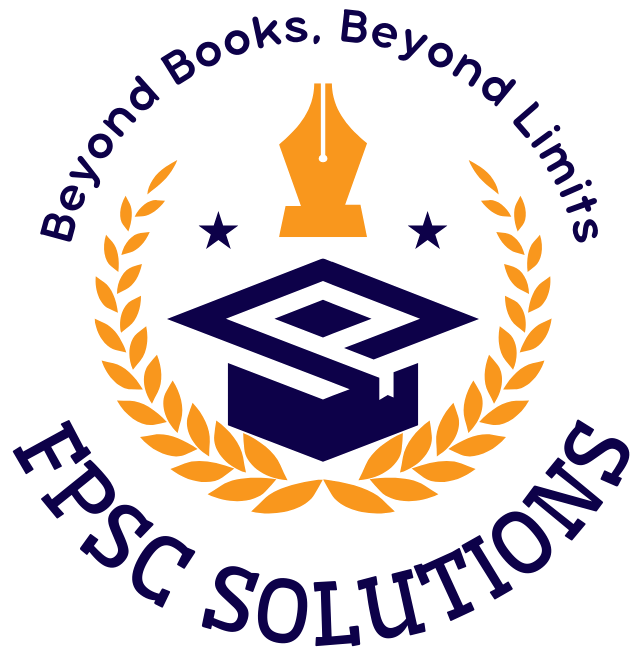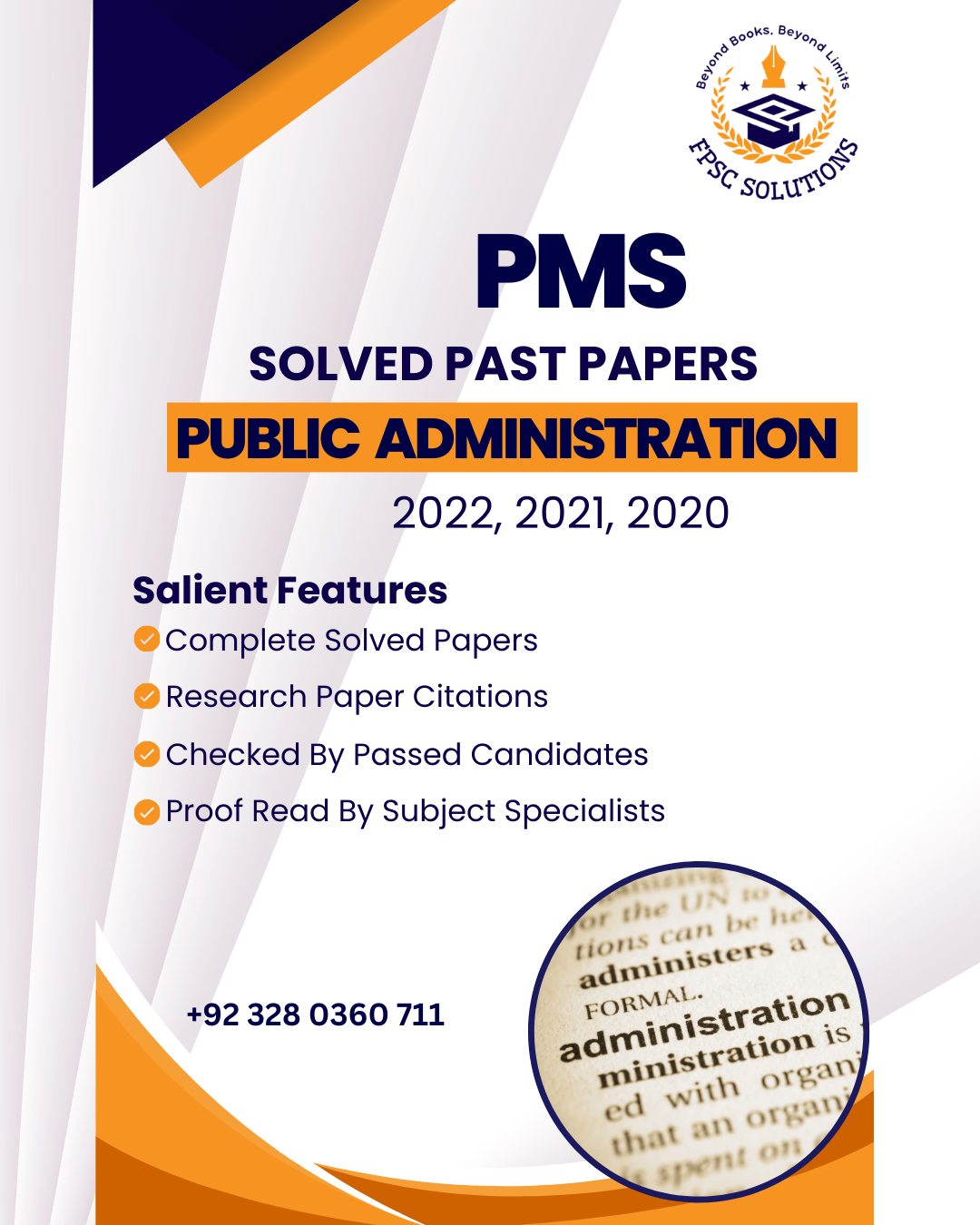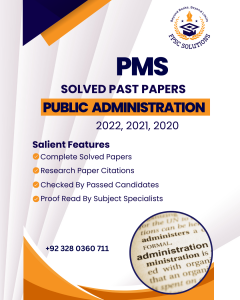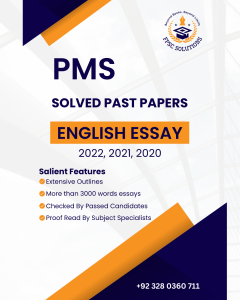In the competitive Examination of Pakistan, particularly for the PMS Public Administration, students are often searching for effective study materials that can enhance their preparation. The PMS Public Administration 2022 Solved Papers solution serves as an invaluable resource, providing comprehensive answers to the exam questions that reflect the core competencies required for success.
This article will teach you about PMS Public Administration Paper 2022, offering insights into its questions and the strategies for crafting well-structured answers. By understanding each of the questions, candidates can better position themselves to excel in their examinations. This analysis of the PMS solved paper Solutions and complete preparations material will provide the knowledge of how to write complete and convincing answers.
PMS Public Administration Past Paper 2022
Paper I
Q1. Public Administration is a newly emerged discipline compared to other disciplines of the social sciences. Why is it necessary to study public administration as a separate discipline? What is the relationship of public administration with other social science disciplines such as political science, economics, and law?
Q2. What are the challenges facing public organizations in the 21st century? How can these challenges be addressed?
Q3. Political actors seek to influence the outcome of a political process through direct or indirect actions. Describe the policy-making process and the actors who play a significant role in the policy-making process and in shaping administrative issues.
Q4. Explain the concept of a performance budget. How can this approach be used to improve the efficiency and effectiveness of government programs and services? What are some examples of successful implementation of a performance budget?
Q5. Public Sector HRM has been characterized by the creation of more flexible structures and processes nowadays. Compare and contrast between the traditional and a new approach to public management. What are the key issues and challenges of implementing an efficient HRM in the public sector?
Q6. Decision-making is the process by which an optimal choice is made among several possible alternatives of solutions. Write down the bureaucratic, rational, and incremental approaches to decision-making with an example of each.
Q7. Discuss the importance of decentralization in governance. What are some effective strategies for implementing decentralization?
Q8. Explain the concept of “whistleblowing” and its role in preventing administrative corruption.
Q9. What is the role of public participation in development? Signify the relationship between participatory development and good governance, and its outcomes.
Paper II
Q1. Over the past few years, various ministries have established “Delivery Units” such as the Prime Minister’s Performance Delivery Unit (PMDU), Social Protection Delivery Unit (formerly Ehsaas Delivery Unit), etc. What is the purpose of these delivery units and why are they needed, despite of having a complete ministerial structure and staff?
Q2. A system of local government that is genuinely empowered politically, administratively, and financially is the heart of democracy. Describe the Local Government System under Devolution of Power Plan 2001, its structural framework, innovative features, challenges, and prospects.
Q3. Has the Eighteenth Amendment been a hurdle in the implementation of the Single National Curriculum (SNC) of the Federal Government? Justify your answer.
Q4. What major challenges have arisen as a consequence of the global trend toward democratization, privatization, and globalization of the world economy? How Pakistan Civil Services as an institution can combat these challenges?
Q5. Why do public policies fail? Elaborate by citing two public policies in Pakistan that failed to achieve their objectives.
Q6. A budget is a powerful instrument of legislative control and a tool of financial administration. Briefly explain the methods and the actors involved in the budgetary process from the preparation, enactment, and execution of the budget.
Q7. Some scholars argue that ‘specialists’ should be inducted into the public service instead of generalists. Give your opinions on this statement with examples.
Q8. Differentiate between “Orthodox” Public Administration and the New Public Management approach by focusing on the tenets, challenges, remedies, and organizational regulation.
PMS Public Administration past paper(1 &2) 2022 Complete Solution with Citation
-
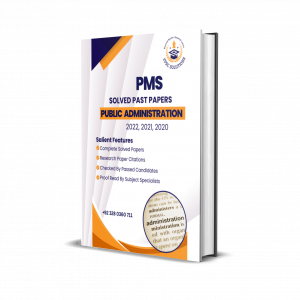
PMS PUBLIC ADMINISTRATION SOLVED PAST PAPERS 2022, 2021, 2020
₨ 999 – ₨ 2,499Select options This product has multiple variants. The options may be chosen on the product page
How to Write an Answer for Each Question
Paper1
Q1. Public Administration is a newly emerged discipline compared to other disciplines of the social sciences. Why is it necessary to study public administration as a separate discipline? What is the relationship of public administration with other social science disciplines such as political science, economics, and law?
Begin with a clear definition of public administration and its evolution as a distinct field. Discuss its relevance in addressing societal issues, and elaborate on its interconnections with political science, economics, and law. Use examples to illustrate how these disciplines inform public administration practices.
Q2. What are the challenges facing public organizations in the 21st century? How can these challenges be addressed?
Identify key challenges such as technological advancements, globalization, and public accountability. Propose solutions like adopting innovative management practices and enhancing stakeholder engagement to tackle these issues effectively.
Q3. Political actors seek to influence the outcome of a political process through direct or indirect actions. Describe the policy-making process and the actors who play a significant role in the policy-making process and in shaping administrative issues.
Outline the stages of the policy-making process, including agenda setting, formulation, adoption, implementation, and evaluation. Highlight the roles of various actors, such as government officials, interest groups, and the public, in shaping policies.
Q4. Explain the concept of a performance budget. How can this approach be used to improve the efficiency and effectiveness of government programs and services? What are some examples of successful implementation of a performance budget?
Define performance budgeting and explain its significance in enhancing government efficiency. Provide examples of successful implementation, such as specific programs that have benefited from this approach.
Q4. Public Sector HRM has been characterized by the creation of more flexible structures and processes nowadays. Compare and contrast between the traditional and a new approach to public management. What are the key issues and challenges of implementing an efficient HRM in the public sector?
Contrast traditional HRM approaches with modern practices that emphasize flexibility and responsiveness. Discuss challenges such as resistance to change and the need for training and development.
Q6. Decision-making is the process by which an optimal choice is made among several possible alternatives of solutions. Write down the bureaucratic, rational, and incremental approaches to decision-making with an example of each.
Describe the bureaucratic, rational, and incremental decision-making approaches. Provide real-world examples to illustrate each method and discuss their applicability in public administration contexts.
Q7. Discuss the importance of decentralization in governance. What are some effective strategies for implementing decentralization?
Discuss the benefits of decentralization, such as improved local governance and citizen participation. Suggest strategies like capacity building and resource allocation to facilitate effective decentralization.
Q8. Explain the concept of “whistleblowing” and its role in preventing administrative corruption.
Define whistleblowing and discuss its importance in promoting transparency and accountability. Provide examples of whistleblower cases that have led to significant reforms.
Q9. What is the role of public participation in development? Signify the relationship between participatory development and good governance, and its outcomes.
Explain the concept of public participation and its critical role in fostering good governance. Discuss how participatory development leads to better outcomes through community engagement and empowerment.
Paper II
Q1. Over the past few years, various ministries have established “Delivery Units” such as the Prime Minister’s Performance Delivery Unit (PMDU), Social Protection Delivery Unit (formerly Ehsaas Delivery Unit), etc. What is the purpose of these delivery units and why are they needed, despite of having a complete ministerial structure and staff?
Start by defining what delivery units are and their role in government. Explain that these units, like the Prime Minister’s Performance Delivery Unit (PMDU), are established to ensure that government initiatives are implemented effectively. Discuss their necessity despite existing ministerial structures, emphasizing their focus on accountability and results.
Q2. A system of local government that is genuinely empowered politically, administratively, and financially is the heart of democracy. Describe the Local Government System under Devolution of Power Plan 2001, its structural framework, innovative features, challenges, and prospects.
Describe the structural framework of the local government system established by the Devolution of Power Plan 2001. Highlight its innovative features, such as increased local autonomy and community participation. Discuss the challenges it faces, including bureaucratic resistance and funding issues, and explore its future prospects for enhancing democracy in Pakistan.
Q3. Has the Eighteenth Amendment been a hurdle in the implementation of the Single National Curriculum (SNC) of the Federal Government? Justify your answer.
Evaluate how the Eighteenth Amendment has impacted the implementation of the Single National Curriculum (SNC). Discuss the challenges posed by provincial autonomy in education and how this has led to inconsistencies in curriculum standards across the country. Justify your answer with specific examples.
Q4. What major challenges have arisen as a consequence of the global trend toward democratization, privatization, and globalization of the world economy? How Pakistan Civil Services as an institution can combat these challenges?
Identify the major challenges that have emerged from democratization, privatization, and globalization. Discuss how these trends affect the Pakistan Civil Services and suggest strategies for overcoming these challenges, such as adopting modern management practices and enhancing public accountability.
Q5. Why do public policies fail? Elaborate by citing two public policies in Pakistan that failed to achieve their objectives.
Analyze why public policies often fail in Pakistan. Provide examples of two specific policies that did not achieve their objectives, discussing the reasons behind their failures, such as lack of stakeholder engagement or inadequate resources.
Q6. A budget is a powerful instrument of legislative control and a tool of financial administration. Briefly explain the methods and the actors involved in the budgetary process from the preparation, enactment, and execution of the budget.
Explain the budgetary process, detailing the stages of preparation, enactment, and execution. Identify the key actors involved, such as the Ministry of Finance and parliamentary committees, and discuss their roles in ensuring effective financial administration.
Q7. Some scholars argue that ‘specialists’ should be inducted into the public service instead of generalists. Give your opinions on this statement with examples.
Present arguments for and against the induction of specialists into public service instead of generalists. Use examples to illustrate how specialists can bring expertise to specific areas while generalists provide broader perspectives necessary for effective governance.
Q8. Differentiate between “Orthodox” Public Administration and the New Public Management approach by focusing on the tenets, challenges, remedies, and organizational regulation.
Differentiate between Orthodox Public Administration and New Public Management by discussing their core principles, challenges, and regulatory frameworks. Highlight how each approach addresses the needs of public administration in different contexts.
The PMS Public Administration 2022 Solved Paper is an essential tool for students preparing for the PMS Examination in Pakistan. By thoroughly engaging with the questions presented in this paper, candidates can enhance their understanding of public administration concepts, improve their writing skills, and ultimately increase their chances of success. This resource not only aids in exam preparation but also equips students with valuable knowledge applicable in their future careers in public service.
